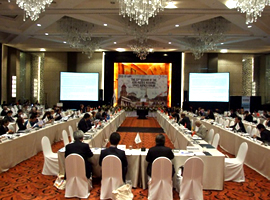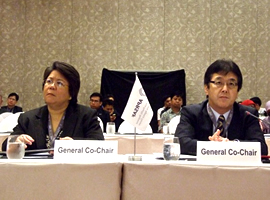APRSAF-23

The 23rd Session of the Asia-Pacific Regional Space Agency Forum (APRSAF-23), Manila, the Philippines, November 15-18, 2016
Overview
-

Plenary Session
-

General Co-chairs
The 23rd session of the Asia-Pacific Regional Space Agency Forum (APRSAF-23) concluded its four-day program successfully on Friday, November 18, 2016, in Manila, Philippines. APRSAF-23's theme was "Building a Future through Space Science, Technology, and Innovation." It was co-organized by the Philippine Council for Industry, Energy, and Emerging Technology Research Development of the Department of Science and Technology (DOST-PCIEERD), Japan's Ministry of Education, Culture, Sports, Science and Technology (MEXT), and Japan Aerospace Exploration Agency (JAXA). It was attended by 576 participants from 33 countries and regions, and 10 international organizations.
Similar to previous APRSAF sessions, APRSAF-23 consisted of four parallel working group sessions on Day 1 and Day 2, and the plenary session of the APRSAF-23 commenced on Day 3 (November 17). It was co-chaired by Research and Development Undersecretary Rowena Cristina L. Guevara from the DOST and Research and Development Bureau Deputy Director General Ryuichiro Shirama from the MEXT. It began with an opening speech by DOST-PCIEERD Executive Director Carlos Primo C. David and welcome remarks by the plenary session's co-chairs. DOST Secretary Fortunato T. De La Peña delivered a keynote speech, stating the usefulness of the space and introducing the application of space and an expectation of establishing a national space agency in the Philippines to solve social problems.
Following opening remarks and keynote speech, there were also activity reports from countries in the Asia-Pacific region, progressive reports from working groups and initiatives.
Two special sessions were held during the plenary session on Day 3. The first special session, titled "Space for Society: Technology Mitigates Natural Disasters," was organized by the DOST. This session introduced the utilization of space technologies (e.g., satellite data for agricultural drought management, disaster risk reduction and management), and activities of Sentinel Asia, GSMap Application to Landslide Warning System (GLAWS), and Committee on Earth Observation Satellites (CEOS) Disaster Risk Management.
The second special session, titled "Small Satellites for Innovation; DIWATA-1 Highlights: Breakthrough by Collaboration, Fostering the Next Generation," presented the success story of "DIWATA-1," which is the Philippines' first microsatellite, and the potential of small satellites. DIWATA-1 was developed and launched under the PHL Microsat program. Meanwhile, JAXA International Space Station (ISS) Program Manager Koichi Wakata introduced the activities that utilize "Kibo," which is a Japanese experimental module on the ISS from where DIWATA-1 was deployed.
At the beginning of Day 4, activity reports on space cooperation in the Asia-Pacific region were made by related entities and international organizations including GEO, UNESCAP, ADB, APSCO.
Following the reports from the working groups and participating countries and entities, leaders from the Asia-Pacific region shared their observations on APRSAF and visions for building a future through space science, technology, and innovation in a wrap-up session. Afterward, the Indian Space Research Organisation (ISRO) made a proposal on its hosting of APRSAF-24 in Bangalore, India from November 14 to 17 in 2017.
At the end of the plenary session, the participants confirmed the recommendations from APRSAF-23 and reaffirmed their continuous efforts to build a future through space science, technology, and innovation.










